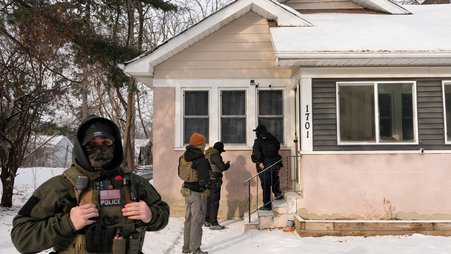'When revealing secret documents, one law helps us like no other.'
Good piece over at War Is Boring on how it used the FOIA for national security reporting, when it failed, and the need for legislative reform.
LAWSUITS
- DoD fights lawsuit seeking unclassified report on nuclear needs of Israel and NATO allies
- Doing your bros a solid: "The identities of federal immigration judges who were the targets of misconduct complaints can remain confidential, a Washington federal judge has ruled."
- Birther-troll Orly Taitz sues HHS for FOIA violations.
'Intelligence, defense whistleblowers remain mired in broken system.' McClatchy:
Since 9/11, defense and intelligence whistleblowers such as Greenstein have served as America’s conscience in the war on terrorism. Their assertions go to the heart of government waste, misconduct and overreach: defective military equipment, prisoner abuse at Abu Ghraib, surveillance of Americans.
Yet the legal system that was set up to protect these employees has repeatedly failed those with the highest-profile claims. Many of them say they aren’t thanked but instead are punished for speaking out.
More than 8,700 defense and intelligence employees and contractors have filed retaliation claims with the Pentagon inspector general since the 9/11 attacks, with the number increasing virtually every year, according to a McClatchy analysis.
While President Barack Obama expanded protections for these whistleblowers, his changes didn’t go far enough to address the gaping holes in an ineffective and unwieldy bureaucracy for those who claim retaliation, McClatchy found.

"Is that information you are still interested in? I know that you
received some information, but some information was withheld and I was
wondering whether you are still interested in the withheld portions of
the records. If you are, I can go ahead and process (the request).
But, if not, you know, you can tell me if you want it withdrawn or
not.""What was the date of my original FOIA request?"
"Um, it looks like it was all the way back in April of 2009."
"April 2009?"
"Yes. So it's quite old."
"Yeah."
"Ummm …"
"Yeah, 2009!"
"Yeah."
"So, it has been five years. Let's see. I'm 53. If I retire at the age of 65 — I am trying to think if you guys will be able to get me the records by then."
(Silence.)
"Yeah, I am still interested in them."
"OK. All right."
"I mean, I'm not going to hold my breath, obviously."
Foreign lobbying database: POGO has a shiny new database with four-years-worth of info on lobbying in the U.S. by foreign agents.
FOIA in the UK: The U.K.'s Freedom of Information Act is ten-years old this year. From the BBC: "thanks to the actions of a 'naive, foolish, irresponsible nincompoop,' the British people acquired an important new legal right."
"That anyway is how Tony Blair castigates himself in his memoirs for allowing his government to proceed with introducing the Freedom of Information Act. The law, which came into force on 1 January 2005, gives everyone the right to obtain much of the information held by public authorities (with numerous substantial exceptions)." From the Manchester Evening News:
Since then it has become an indispensable tool for journalists, allowing the M.E.N. and other news organisations to unearth startling revelations that might otherwise have remained buried.
From exposing how Rochdale MP Cyril Smith bullied police investigating allegations he abused young boys to revealing how sex offenders have been granted taxi licences, our reporters have used the legislation to break a series of major stories over the last decade.
It has also led to more lighthearted tales, throwing up funny facts such as a bizarre spate of crimes committed by clowns.
Describing the success of newspapers' use of the legislation, Justice Minister Simon Hughes commented: “The FOI Act has been a triumph for transparency.
“FOI is not only about the high-profile, headline-making releases of information but about the right of the individual to find out about the issues that matter to them.
“It is a fundamental right of all citizens to be able to hold their government to account and that is why transparency is vital.”
STATE NEWS
- Bill arrives at Michigan Gov. Rick Snyder's desk that would make public records cheaper, easier to get in Michigan.
- Next door in Illinois, state legislature overrides governor Pat Quinn's veto of a bill that will allow the state to charge time and labor costs for voluminous public records requests.
- Oregon school district sues newspaper to withhold emails about superintendent's performance.
- Seattle police hold hackathon to figure out how to redact body cam video streams.




